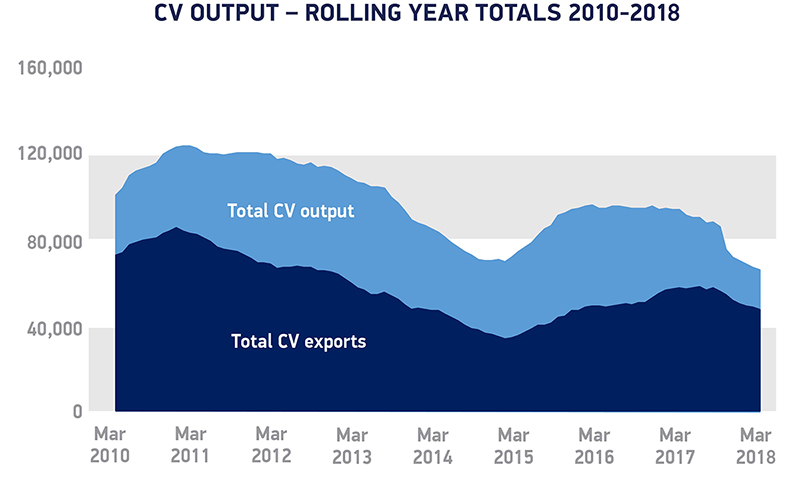- British commercial vehicle production declines for seventh month in March, down -10.8% to 7,145 units.
- Export demand broadly steady, down -1.6%, with just 79 fewer CVs shipped overseas compared with previous March.
- Considerable decline in home demand, with both March and Q1 output falling by a quarter.
- Overall output falls -17.9% in first quarter with 19,252 vehicles manufactured year to date.
Figures released today by the Society of Motor Manufacturers and Traders (SMMT) show that UK commercial vehicle (CV) manufacturing fell for the seventh consecutive month in March. 7,145 vans, trucks, buses and coaches left production lines, representing a -10.8% fall compared with March last year.
While overseas demand remained relatively stable, with just 79 fewer units produced for export, this was not enough to offset the decline in CVs built for the UK market, which fell by -24.9%. The proportion of exported CVs remains at a high level, however, accounting for 66.8% of production in March.
Meanwhile, in the first quarter, 19,252 CVs were built in the UK, down -17.9% on the same period last year. CV manufacture for domestic and overseas markets fell -26.6% and -13.0% respectively, however, exports continue to drive volumes with almost seven in 10 (13,095) CVs built in the UK destined for global customers.
The news comes as SMMT highlights the importance of commercial vehicles in the UK. New consumer research reveals the extent of consumers’ reliance on CVs and the vital role Britain’s 5 million goods and service vehicles play in driving our society and economy. Almost 9 in 10 (88%) British consumers said reduced or restricted CV-driven services would significantly affect their quality of life, while almost half (46%) had directly benefitted from a commercial vehicle in the last 24 hours.1
Mike Hawes, SMMT Chief Executive, said,
With March marking the seventh month of negative growth for UK commercial vehicle manufacturing, it’s clear that economic and political uncertainty continues to take its toll on business confidence.
Fleet investments are huge commitments so government must encourage fleet renewal through the right policies and incentives, and maintain the economic conditions needed to fuel growth in this important sector.










